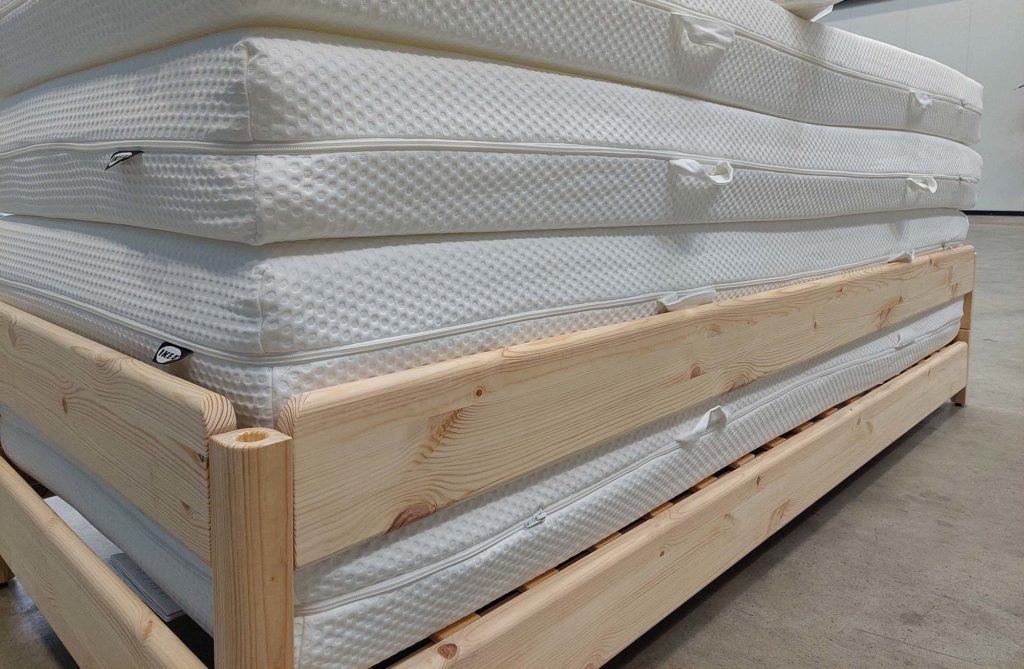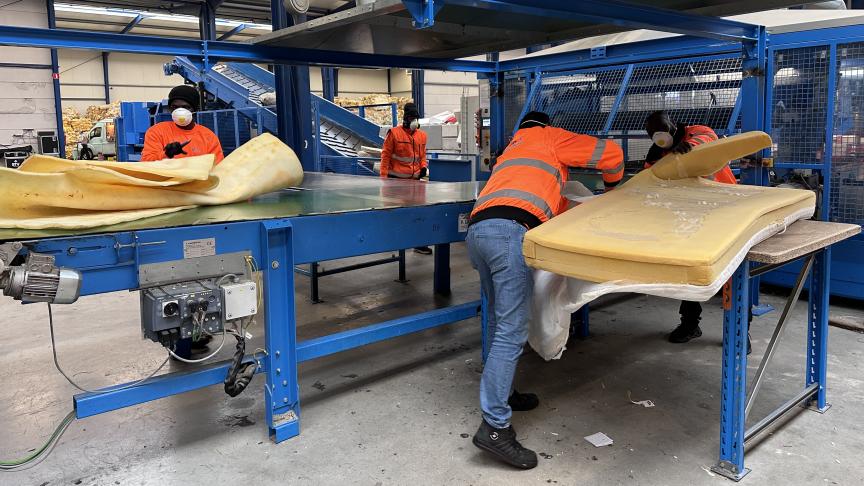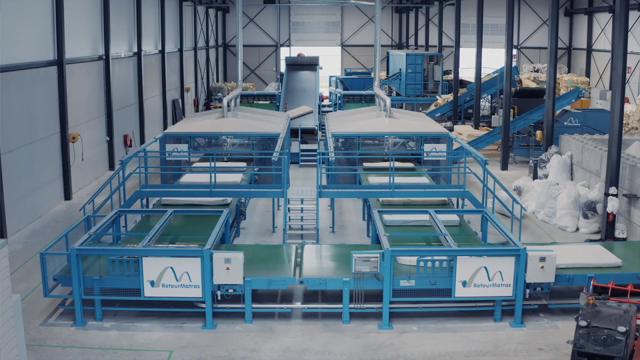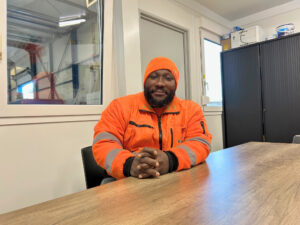Obstacles on the road to a 100% circular mattress
In the Netherlands, Ikea is working hand-in-hand with recycler RetourMatras to ensure that it has sufficient quantities of recycled materials to manufacture its products in the future.
IKEA Circular Event at Lelystad March 13, 2024
Report: Jean-François Munster, Special envoy to Lelystad (Netherlands)
Publication: Le Soir 2/4/2024

Placed on a conveyor belt, the old mattresses are ripped open one by one as they pass close to a circular saw. At the end of the line, masked operators pick them up and strip them with precise gestures. The textile envelope is sent to one side. The foam on another. And any metal springs go in a third direction. We’re in Lelystad, north-east of Amsterdam, at the recycling plant of RetourMatras, one of the European leaders in the sector. The group’s six plants in the Netherlands and Great Britain have the capacity to process 1.5 million mattresses a year, and manage to give new life to 80% of the materials.
After leaving the factory, the springs are sent to steel companies for recycling. The textile will be used to produce non-woven materials (under-carpets, etc.). The foam, for its part, is shredded into small pieces and used to produce floor protection, insulation, shock-absorbing mats for playgrounds, padding… For the past six months, some of this foam has even been used directly to produce new mattresses, fulfilling the promise of total circularity. RetourMatras has invested in a chemical recycling unit next to its Lelystad plant. Here, used polyurethane foam will be mixed with additives and heated for twelve hours in a reactor to bring about its decomposition and return to the stage of polyol, the petroleum-based raw material used to manufacture this foam. This “repolyol” is then sold to foam manufacturers to replace part of the virgin polyol, thereby reducing the product’s environmental footprint.
Ban incineration
An estimated 40 million mattresses are thrown away in Europe every year. Eighty-five percent of these will not be recycled. At best, they are incinerated. At worst, they’re buried in a landfill, where they take 80 to 120 years to degrade. A gigantic waste of resources and a source of CO 2 emissions (in the case of incineration) that could easily be avoided with a little help from legislation, says Chico van Hemert, CEO of RetourMatras. “Incineration or landfilling of mattresses should be banned or made less attractive”, he believes.
He also advocates the widespread introduction of extended producer responsibility (EPR) schemes, as already exist in the Netherlands, France and Belgium. These make companies financially responsible for the cost of managing their waste, and encourage them to manufacture more circular products. He is also calling for cross-border transport of waste to be facilitated, and for legislators to impose minimum percentages of recycled materials in products, in order to create outlets for recycled materials.
“Today, finding customers for our repolyol is a real challenge,” he admits. “Mattress manufacturers are a little scared by the idea of using a product made from waste. It also requires extra effort on their part. Our product has different specifications. We have to carry out tests and adapt the production process. Not to mention the fact that repolyol is more expensive than virgin material. Even if we manage to produce larger volumes, I don’t think we’ll ever be able to compete on price with virgin polyol. If we don’t have legislation setting out obligations to integrate recycled materials, it will be a never-ending battle to try and increase our sales.”

A major shareholder
However, RetourMatras can count on the support of a major ally (and shareholder): furniture giant Ikea. Almost all repolyol is purchased by the Swedish company, which uses it in 31 of its products: sofas, armchairs, mattresses… The Swedish company has set itself ambitious targets in terms of CO 2 emission reduction. While it is investing heavily in the production of green energy – 4 billion so far – and in the electrification of its deliveries, it cannot afford to overlook the materials used to manufacture its products, which make up by far the largest part of its environmental footprint (46.6% in 2023). It has committed to using only renewable or recycled materials by 2030, but “the problem is that in many product categories, there simply aren’t enough recycled materials available”, explains Peter van der Poel, Managing Director of Ingka Investments, the financial arm of the holding company that owns most of Ikea’s stores worldwide.
To speed up the transformation from a linear to a circular economy, the Swedish retailer has decided to take the lead and invest itself in recycling companies active in the materials it consumes most (wood, plastic, textiles, foam…) to accelerate their growth. In 2019, together with waste treatment specialist Renewi, it invested in RetourMatrass. Two years earlier, it had already acquired a stake in plastic recycler Morssinkhof.
Ecodesign
“We need to take care of the materials that are on the market, increase recycling capacities and lower the cost of recycled materials compared to virgin materials… but we don’t know how to do that on our own,” continues Peter van der Poel. “We need to forge partnerships. We want to facilitate the transformation to a circular economy by investing – because we know that this requires a lot of resources and perseverance – and by connecting the various players in the value chain.”
At the same time, Ikea is redesigning its products to make them easier to recycle. Ecodesign is an essential step on the road to circularity, as today many mattresses contain assemblies of different materials glued together or stapled together, making them very difficult to recycle. “Our ambition is to be able to offer fully circular mattresses in the years to come,” concludes the head of Ingka Investments.
In Belgium, two-thirds of used mattresses are collected
Belgium is one of Europe’s best performers when it comes to mattress recycling. It is one of three countries to have introduced extended producer responsibility, obliging companies marketing this type of product to pay for waste management (collection, treatment, dismantling). This obligation is overseen by the Valumat management organization. Mattresses are dismantled either locally (Veolia in Sombreffe and Matrassrecycling in Westerloo) or in neighboring countries (RetourMatrass in the Netherlands and Secondly in France). According to Valimat’s provisional estimates, 66% of the million mattresses put on the market in 2023 will have been collected.
This collection can take place via mattress stores. Unlike electronic appliances, for example, retailers are not obliged to take back mattresses from customers who wish to dispose of them, but Valumat has set up financial incentives to encourage as many of them as possible to do so. Ikea, for example, takes back used mattresses from customers if they come to buy a new one. Consumers can also dispose of their used mattresses via ressourceries – with a view to reuse – and Recyparks. Since mid-2021 in Flanders, early 2023 in Brussels and mid-2023 in Wallonia, special containers dedicated to mattresses have been in place. This means they can no longer be disposed of in the bulky waste bin (unless they are too damp or damaged), which is synonymous with incineration. In 2023, 44% of mattresses collected were recycled, but this rate should mechanically increase this year, since Wallonia only introduced specific containers in mid-2023. There’s still a long way to go. Europe requires a recycling/reuse rate of 50% by 2025 and 75% by 2030.



